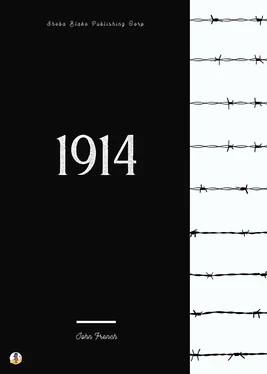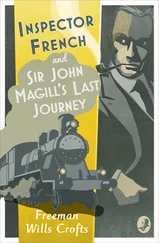John French - 1914
Здесь есть возможность читать онлайн «John French - 1914» — ознакомительный отрывок электронной книги совершенно бесплатно, а после прочтения отрывка купить полную версию. В некоторых случаях можно слушать аудио, скачать через торрент в формате fb2 и присутствует краткое содержание. Жанр: unrecognised, на английском языке. Описание произведения, (предисловие) а так же отзывы посетителей доступны на портале библиотеки ЛибКат.
- Название:1914
- Автор:
- Жанр:
- Год:неизвестен
- ISBN:нет данных
- Рейтинг книги:3 / 5. Голосов: 1
-
Избранное:Добавить в избранное
- Отзывы:
-
Ваша оценка:
- 60
- 1
- 2
- 3
- 4
- 5
1914: краткое содержание, описание и аннотация
Предлагаем к чтению аннотацию, описание, краткое содержание или предисловие (зависит от того, что написал сам автор книги «1914»). Если вы не нашли необходимую информацию о книге — напишите в комментариях, мы постараемся отыскать её.
1914 — читать онлайн ознакомительный отрывок
Ниже представлен текст книги, разбитый по страницам. Система сохранения места последней прочитанной страницы, позволяет с удобством читать онлайн бесплатно книгу «1914», без необходимости каждый раз заново искать на чём Вы остановились. Поставьте закладку, и сможете в любой момент перейти на страницу, на которой закончили чтение.
Интервал:
Закладка:
We drove to the Embassy and lunched there. In the afternoon, accompanied by the Ambassador, I visited M. Poincaré. The President was attended by M. Viviani, Prime Minister, and M. Messimy, Minister for War. The situation was fully discussed, and I was much impressed by the optimistic spirit of the President. I am sure he had formed great hopes of a victorious advance by the Allies from the line they had taken up, and he discoursed playfully with me on the possibility of another battle being fought by the British on the old field of Waterloo. He said the attitude of the French nation was admirable, that they were very calm and determined.
After leaving the President I went to the War Office. Maps were produced; the whole situation was again discussed, and arrangements were made for me to meet General Joffre at his Headquarters the next day.
In the evening I dined quietly with Brinsley FitzGerald at the Ritz, and here it was curious to observe how Paris, like Dover, had put on a sombre garb of war. The buoyant, optimistic nature of the French people was apparent in the few we met; but there was no bombastic, over-confident tone in the conversation around us; only a quiet, but grim, determination which fully appreciated the tremendous difficulties and gigantic issues at stake. The false optimism of “À Berlin” associated with 1870 was conspicuously absent. In its place, a silent determination to fight to the last franc and to the last man.
We left Paris by motor early on the 16th, and arrived at Joffre’s Headquarters at Vitry-le-François at noon. A few minutes before our arrival a captured German flag (the first visible trophy of war I had seen) had been brought in, and the impression of General Joffre which was left on my mind was that he possessed a fund of human understanding and sympathy.
I had heard of the French Commander-in-Chief for years, but had never before seen him. He struck me at once as a man of strong will and determination, very courteous and considerate, but firm and steadfast of mind and purpose, and not easily turned or persuaded. He appeared to me to be capable of exercising a powerful influence over the troops he commanded and as likely to enjoy their confidence.
These were all “first impressions”; but I may say here that everything I then thought of General Joffre was far more than confirmed throughout the year and a half of fierce struggle during which I was associated with him. His steadfastness and determination, his courage and patience, were tried to the utmost and never found wanting. History will rank him as one of the supremely great leaders. The immediate task before him was stupendous, and nobly did he arise to it.
I was quite favourably impressed by General Berthelot (Joffre’s Chief of Staff) and all the Staff Officers I met, and was much struck by their attitude and bearing. There was a complete absence of fuss, and a calm, deliberate confidence was manifest everywhere. I had a long conversation with the Commander-in-Chief, at which General Berthelot was present. He certainly never gave me the slightest reason to suppose that any idea of “retirement” was in his mind. He discussed possible alternatives of action depending upon the information received of the enemy’s plans and dispositions; but his main intention was always to attack.
There were two special points in this conversation which recur to my mind.
As the British Army was posted on the left, or exposed flank, I asked Joffre to place the French Cavalry Division, and two Reserve Divisions which were echeloned in reserve behind, directly under my orders. This the Commander-in-Chief found himself unable to concede.
The second point I recall is the high esteem in which the General Commanding the 5th French Army, General Lanrezac, which was posted on my immediate right, was held by Joffre and his Staff. He was represented to me as the best Commander in the French Army, on whose complete support and skilful co-operation I could thoroughly rely.
Before leaving, the Commander-in-Chief handed me a written memorandum setting forth his views as he had stated them to me, accompanied by a short appreciation of the situation made by the Chief of the General Staff.
We motored to Rheims, where we slept that night. Throughout this long motor journey we passed through great areas of cultivated country. All work, it seemed, had ceased; the crops were half cut, and stooks of corn were lying about everywhere. It was difficult to imagine how the harvest would be saved; but one of my most extraordinary experiences in France was to watch the farming and agriculture going on as if by magic. When, how, or by whom it was done, has always been an enigma to me. There can be no doubt that the women and children proved an enormous help to their country in these directions. Their share of the victory should never be forgotten. It has been distilled from their sweat and tears.
On the morning of the 17th I went to Rethel, which was the Headquarters of the General Commanding the 5th French Army. Having heard such eulogies of him at French G.H.Q., my first impressions of General Lanrezac were probably coloured and modified in his favour; but, looking back, I remember that his personality did not convey to me the idea of a great leader. He was a big man with a loud voice, and his manner did not strike me as being very courteous.
When he was discussing the situation, his attitude might have made a casual observer credit him with practical powers of command and determination of character; but, for my own part, I seemed to detect, from the first time my eyes fell upon him, a certain over-confidence which appeared to ignore the necessity for any consideration of alternatives. Although we arrived at a mutual understanding which included no idea or thought of “retreat,” I left General Lanrezac’s Headquarters believing that the Commander-in-Chief had over-rated his ability; and I was therefore not surprised when he afterwards turned out to be the most complete example, amongst the many this War has afforded, of the Staff College “pedant,” whose “superior education” had given him little idea of how to conduct war.
On leaving Rethel, I motored to Vervins, where I interviewed the Commanders of the French Reserve Divisions in my immediate neighbourhood, and reached my Headquarters at Le Cateau late in the afternoon.
The first news I got was of the sudden death of my dear old friend and comrade, Jimmie Grierson (General Sir James Grierson, Commanding the 2nd Army Corps). He was taken ill quite suddenly in the train on his way to his own Corps Headquarters, and died in a few minutes. I had known him for many years, but since 1906 had been quite closely associated with him; for he had taken a leading part in the preparation of the Army for war throughout that time. He possessed a wonderful personality, and was justly beloved by officers and men alike. He was able to get the best work out of them, and they would follow him anywhere. He had been British Military Attaché in Berlin for some years, and had thus acquired an intimate knowledge of the German Army. An excellent linguist, he spoke French with ease and fluency, and he used to astonish French soldiers by his intimate knowledge of the history of their regiments, which was often far in excess of what they knew themselves. His military acquirements were brilliant, and in every respect thoroughly up-to-date. Apart from the real affection I always felt for him, I regarded his loss as a great calamity in the conduct of the campaign.
His place was taken by Sir Horace Smith-Dorrien, although I asked that Sir Herbert Plumer might be sent out to me to succeed Grierson in command of the 2nd Corps. As a matter of fact, the question of Sir James Grierson’s successor was not referred to me at all. The appointment was made at home. Although I knew Sir Horace to be a soldier who had done good service and possessed a fine record, I had asked for Sir Herbert Plumer because I felt he was the right man for this command.
Читать дальшеИнтервал:
Закладка:
Похожие книги на «1914»
Представляем Вашему вниманию похожие книги на «1914» списком для выбора. Мы отобрали схожую по названию и смыслу литературу в надежде предоставить читателям больше вариантов отыскать новые, интересные, ещё непрочитанные произведения.
Обсуждение, отзывы о книге «1914» и просто собственные мнения читателей. Оставьте ваши комментарии, напишите, что Вы думаете о произведении, его смысле или главных героях. Укажите что конкретно понравилось, а что нет, и почему Вы так считаете.












